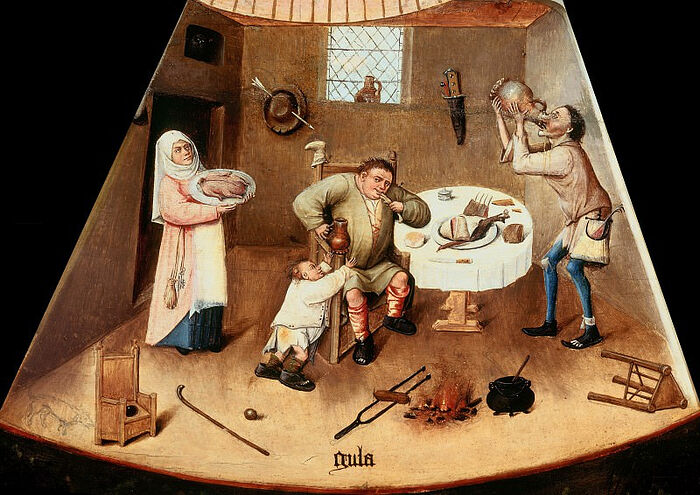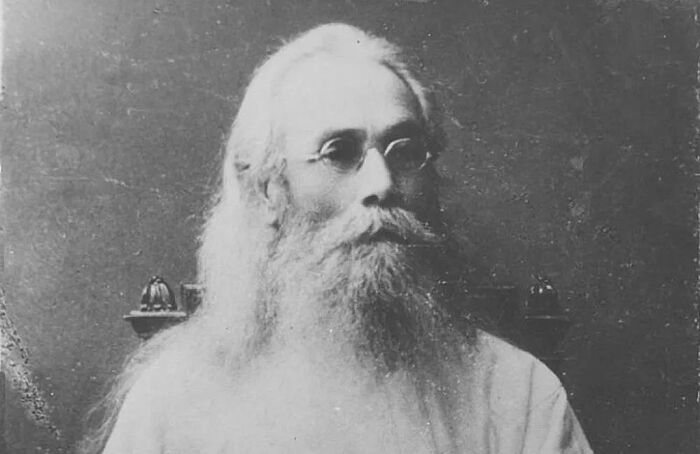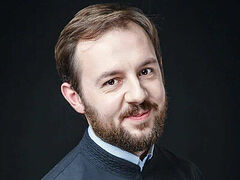In the modern world, especially over the past 100-150 years, humanity has made huge breakthroughs in science and life in general. If for many centuries people lived mostly by crafts and agriculture, today everything is different. There is medicine, technology, new professions, new opportunities. Fashion and social rules have changed many times, from decade to decade. Today some people work in outer space, while others, sitting at a computer, manage very complex processes, such as the movement of trains in the city or the assembly of automobiles on the conveyor belt. It seems that we should have all changed and become more perfect, but something that never changes in us is our propensity to sin.
 The Expulsion of Adam and Eve from the Garden of Eden. Fragment of fresco of the Holy Trinity Kalyazin Monastery
The Expulsion of Adam and Eve from the Garden of Eden. Fragment of fresco of the Holy Trinity Kalyazin Monastery
Any human being, regardless of his education, upbringing, social status, lifestyle, views and worldview, is prone to sinful passions. So the instructions of the Holy Fathers of Antiquity, such as The Ladder of Divine Ascent by St. John Climacus, are relevant to this day, because the human soul remains the same as before: vulnerable and weak in the face of sin. Science changes, the world around us changes, like the scenery in a theater, but human beings remain the same, with their sins and passions. So what are these passions?
Sin and passion are inextricably linked, but they should be considered separately. We call sin a person’s action which violates one of God's commandments: when someone judges his neighbor, tells him a lie, stealssomething, offends someone, and so on. Passion is a person’s propensity for a particular sin. If we compare sin with illness, as the saints often did, calling sins “illnesses of the soul”, then sin is a one–time illness, while passion is a chronic one.
Each one of us has his own passions. Some are susceptible to lying, others to lust, others to drinking, pride, jealousy, etc. According to the Holy Fathers, there is a tempter next to each one of us, who, figuratively speaking, constantly whispers in our ear, enticing us into sin. And if for some it is only an occasionally passing thought, for others it is a temptation, a real passion, which eventually becomes a problem, maybe even an addiction.
The Holy Fathers identify seven main passions that correspond to the seven deadly sins: pride, love of money (avarice), anger, envy, lust, gluttony and despondency. Sometimes, apart from pride, vanity is added to this list as the eighth passion. Lying is not included in this list, since it is an invariable companion of many mortal sins: for instance, it is impossible to commit adultery without lying, or to be arrogant and vain without pretending to be a modest person so as not to be judged, or to envy without demonstrating it, and so forth. In addition to the main (mortal) sins, there are also other ones that can enter into a person’s soul in a state of passion.
 H. Bosch. Gluttony: Fragments of the painting, The Seven Deadly Sins. 1500.
H. Bosch. Gluttony: Fragments of the painting, The Seven Deadly Sins. 1500.
I think everyone has met in his life, especially in childhood, a friend with a rich imagination who would invent interesting tall tales right on the go, and therefore it was interesting to take walks with him. And even though we understood that it probably wasn’t the truth, we wanted to believe such fantasies. Over time, as we grow up, each one of us realizes that that a bent piece of iron behind the garages is unlikely to have fallen off a “flying saucer that had flown over the area”, and in the unfinished building in the next block there could hardly have been a hidden treasure that we “will definitely find”. And then you probably noticed that this friend lies not only during a walk to impress his peers, but also in all sorts of small things: Now he tells others about things that you didn't do, then he tells you some lies, and so on. And he doesn’t do it for the sake of profit. He does it for no particular reason, just for fun.
And constant lying in everything and everywhere is a passion. I know a young lady who lied to everyone all the time and couldn’t explain why she did it. Moreover she repeatedly suffered from her own lies; her relations with her loved ones were ruined, she lost a number of jobs, but still continued to lie. Actually, we first met when she came to church, trying to figure out what her curse was and who had put it on her, since everything in her life was falling apart. But, as it turned out, the cause was in herself, in this passion, and not in magic curses. Over time, she to tried to overcome this bad habit, going to church for confession and Communion. I hope she will succeed.
And whatever sinful passion you have, be it lying, jealousy, lust or anger, the result can be detrimental not only for your spiritual life, but also for your physical life. Someone who is prone to passions gradually spoils his relationships with his relatives, colleagues, and superiors, and will ultimately have no one around him who can support him physically, morally, or by prayer– which is the most important thing.
In terms of the influence of passions on a person, St. Barsanuphius of Optina divided people into three groups: the carnal, the struggling, and the perfect. Carnal people are those who are enslaved by their passions, like that young lady. They do not even notice this sinful habit in themselves, or they have simply drowned out their voice of conscience in order to sin for their pleasure and not to feel its pangs. Only awareness of your passion, sincere repentance, and attempts to improve can bring you closer to salvation, as was the case with the Good Thief on the Cross who repented and was saved by Christ.
People of the second category are those who struggle with their passions. This is the second step in the fight against sin. St. John Climacus advises us to combat sins with the opposite virtues. A person who is susceptible to anger can be saved if he does good to his opponents and prays for them, as Christ commanded us: Love your enemies, bless them that curse you, do good to them that hate you, and pray for them which despitefully use you, and persecute you (Mt. 5:44). And A judgmental person should mentally try to justify everyone he wants to judge, just as we justify ourselves if we do something bad to soothe our conscience. And the Lord will definitely not abandon those who struggle, and He will help them.
Lastly, perfect people are those who keep their passions in check. Although they do have passions, they keep them under control. There have been very few such people in history. Of course, we are talking about saints. Not everyone has this level of control over their desires and souls. It would be good for us sinners to keep on the second step without falling.
But the most important thing that we can learn from the Gospel and Patristic works is that a person cannot overcome these passions by himself. We cannot do without God’s help. If a person decides to challenge himself without God and change one of his bad personality traits, then yes, he can achieve success, but only outwardly. However, spiritually this bad trait will only be replaced by pride. He will say, “I’ve done it! Good for me! I am special and better than many people around me!”, like the Pharisee from the Parable of the Publican and the Pharisee (cf. Lk. 18:9-14). It is impossible to overcome your passions on your own: God alone can do it.
However, a person must himself make efforts; unless he tries to work at self-improvement, the Lord will not violate his free will. It is important to keep in mind that we are not puppets in His hands. God has given us freedom and guidance on how to live according to His will, and we can and should make our own choices. It is necessary to pray regularly, participate in the sacraments of confession and Communion so as not to walk away from God but to stay in contact with Him, and try to avoid evil and do good works.
As for the general principles for combating passions, the following steps can be pointed out:
Awareness of your passions. The first step to fighting passions is to become conscious of their presence. Everyone should understand exactly what desires and bad habits have begun to take control over us and cause negative emotions in us or in people around us, and what actions make them stronger. It is important to learn to discern our passions and try not to yield to them.
Turning to God. According to the ancient saying: “Without God you can do nothing.” It is impossible to get rid of your sins and passions without God's help. We can easily drown out our voice of conscience and get a swelled head over our successes. Keeping in mind that we are weak in the face of sin, we must begin to live a spiritual life. Many try to justify their independence, saying, “God is in my soul, but churches are just a business based on faith, and I don't want to pay them.” This opinion, or rather excuse, is shared by many laypeople who are simply too lazy to embark on their Orthodox path. But you don't need money to come to church!
In Orthodoxy no one forces anyone to buy candles or order special prayer services. The most basic things in churches have always been and will be free of charge: to pray for yourself and your loved ones at services is free, confession and Communion are free too. It all depends on you—do you really want this? Are you ready to start working at self-improvement and change your life? It is a long, painstaking and life-long labor. It is not without joys, but also not without obstacles. The Holy Fathers say that the Church is a hospital for both the spirit and the soul, and healing both your body and soul requires time and effort. One pill cannot cure a chronic physical disease. The soul is the same in principle.
The next step is to find a priest who is close to you mentally. All priests are human beings. Every priest has his own temperament, character and sins. There is no doctor who never falls ill. And as with all people, it is easy to communicate with some and it is not so easy with others. Someone needs a strict mentor, someone else needs an easy-going and open one. Find someone with whom it will be easy for you to talk about your spiritual life.
And of course, if you have close people around you who understand you, then you will be able to share your worries and fears with them. Love and mutual support are an integral part of spiritual life. The Lord spoke about this: By this shall all men know that ye are My disciples, if ye have love one to another (Jn. 13:35).
In conclusion, I should say that sinful passions bring misfortune to both the person himself and to his loved ones. Fighting with passions takes a lot of time, effort, and patience. But if you live a spiritual life, you can not only get closer to salvation in the Heavenly Kingdom, but , you can live a happier and more harmonious life already here, on earth.






